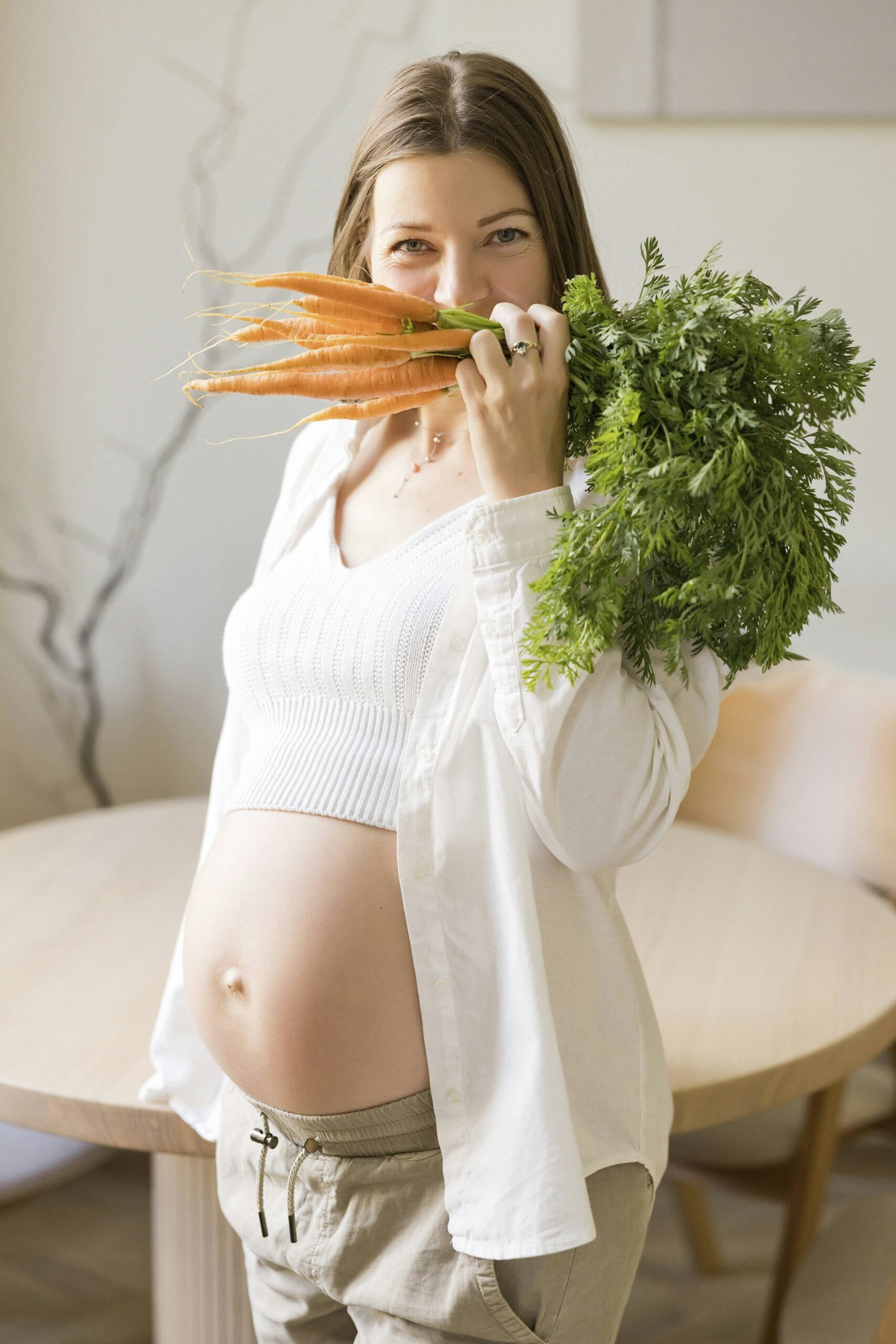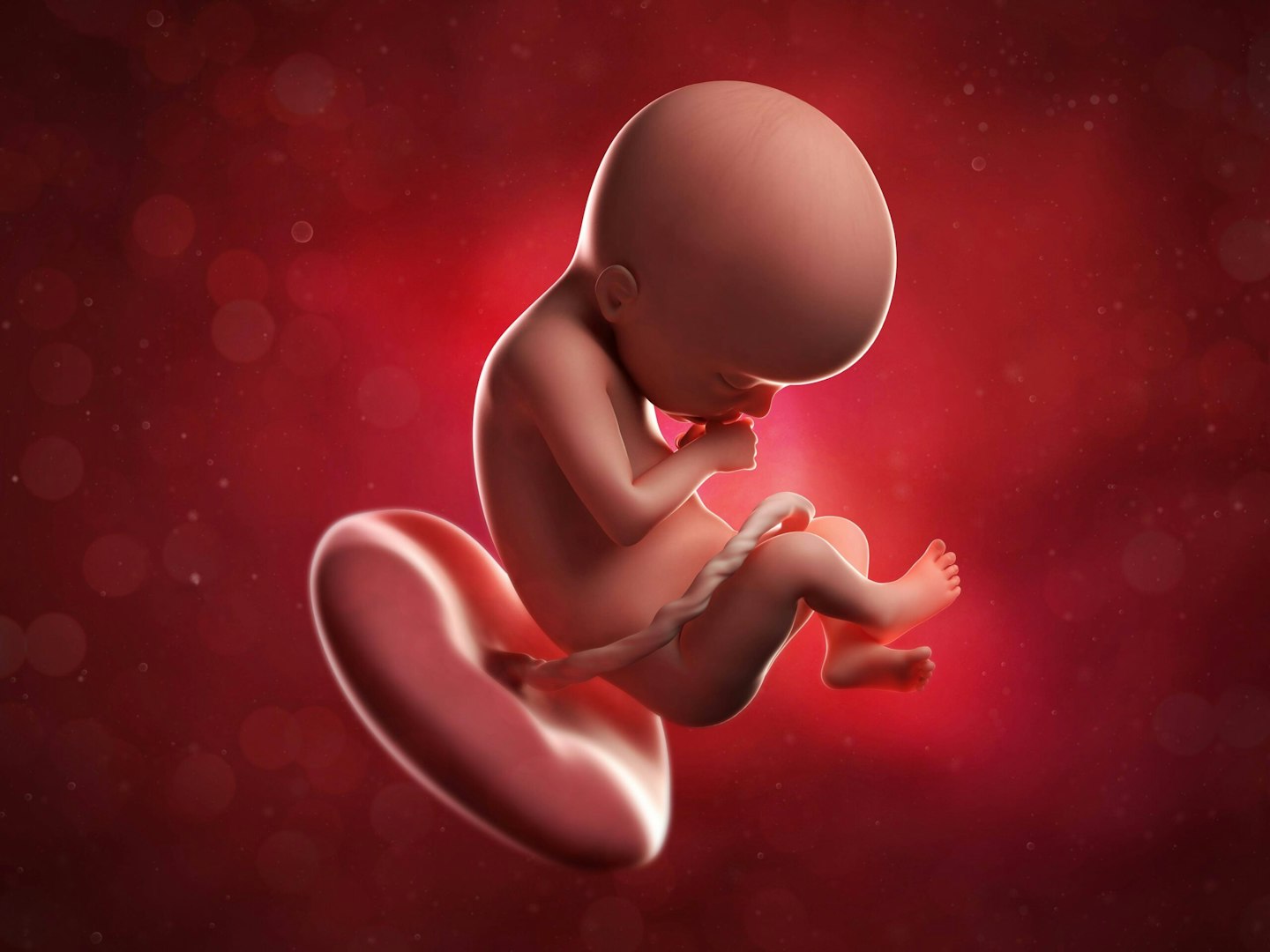
Medically Reviewed by: Katherine Walker, NCT Practitioner
At 21 weeks pregnant, your baby is growing fast, your skin is changing, and the movements in your womb are intensifying. You may have noticed that you are reaching for snacks a little more often (which is perfectly normal). Try and opt for a healthy diet full of pregnancy superfoods, as tempting as those choccies may be. This week, we are going to break down what you can expect to experience and how your baby is growing, as well as a useful guide on what you can do to get organised for your new arrival.
You'll also start to notice that your bump is really starting to bloom! Pregnancy weight gain varies a lot among expectant mothers; as a guide, anywhere between 8-14lbs would be usual, especially if you are expecting twins. It’s typical to gain up to 28 pounds in total during your pregnancy, and most of this would be after 20 weeks.
How many months pregnant is 21 weeks
Counting your pregnancy in weeks and months can get confusing. Around now, you are five months pregnant! Congratulations, you're at the halfway mark. Your baby now weighs more than the placenta, which, until this week, has been heavier than your baby.
In the fifth month of your pregnancy, you'll probably feel your baby moving inside you a lot more (which is super exciting), depending on the location of the placenta, and you might be beginning to feel more symptoms. If you’re having multiples, you’ll likely feel more movement and earlier in your pregnancy.
How big is my baby at 21 weeks pregnant?
Leaving the fruit analogies behind in favour of vegetable ones, your baby is now the size of a large carrot. They're growing fast, now measuring around 26.7cm long from head to toe and weighing between 11 and 12 and a half ounces.

What our expert says about being 21 weeks pregnant
Katherine Walker, Service Development Manager at NCT, said: “Your pregnancy may be becoming more obvious now, and you may need to find some maternity clothing that stretches as your bump grows. Your growing baby means you might also be hungrier, so maybe you should have some emergency snacks on hand.
“Your baby’s senses are developing fast. Your baby will be able to hear sounds from outside the womb and may respond to loud noises or familiar voices. They may quieten or kick in response to your belly being held or rubbed. Their taste buds are developing too, and the amniotic fluid may taste of what you have eaten.”
21 weeks pregnant symptoms
There are a few pregnancy symptoms that you might start to notice at this stage, including:
Varicose veins
Varicose veins are swollen, twisted veins under the skin, usually on the legs. With each week of pregnancy, more pressure builds up on the veins in your legs, and increasing progesterone levels, which relax the walls of the veins, only make it worse. To try to minimise these veins, exercise regularly, and wear compression socks, as recommended by your doctor or pharmacist and prop up your legs whenever you get a chance. If you have varicose veins that are bleeding, you should seek urgent medical assistance.
Itchy skin
As the skin on your stomach stretches, it becomes thinner and drier, which can lead to an itchy, dry feeling. If you have an itchy bump, use a bump oil to moisturise, soothe and keep skin soft and supple.
Stretch marks
This comes hand-in-hand with itchy skin! Pregnancy certainly isn’t all glamour, so you may have noticed stretch marks appearing on your body, whether on your stomach, bottom, legs, thighs, hips or breasts. This is happening now because your body is expanding, and the supporting tissue under your skin gets torn as your skin stretches. Stretch marks are common in pregnancy and are linked to hormonal changes, how elastic your skin is, and your genetics.
Constipation and gas
Remember when we said pregnancy wasn’t all glamorous? The increased pressure your uterus is putting on your rectum means you might be a bit gassier than usual. Drink lots of water and eat foods rich in fibre to avoid constipation, which can worsen the problem.
Dry skin
While some people experience dry skin, others find they now have to deal with acne thanks to increased oil production. Try a gentle soap or cleanser, and stick to oil-free make-up and products to avoid exacerbating the acne. Depending on the severity and whether or not you're a glass-half-full kind of person, you might call this pregnancy glow and see it as a positive!
Heartburn
Would it really be a list of symptoms if this didn't pop up?! It's that symptom that just will not go away! For some, it is worth more than others; if you are suffering, we feel for you. Using some over-the-counter heartburn remedies may ease your discomfort as well as eating smaller meals. Avoid caffeine and spicy or greasy foods, as they can be triggers. Keeping a food diary might make it easier for you to figure out exactly what your triggers are.
Baby Development at 21 Weeks Pregnant
Around this time, the baby becomes covered in a very fine, soft hair called lanugo. The purpose of this is unknown, but it may be to keep the baby at the right temperature. The lanugo usually disappears before birth. Lanugo tends to fall off the baby's skin from 32 weeks.
What’s my baby doing at 21 weeks pregnant?
You might have felt more activity in your womb than usual, and that’s because the initial fluttering movements you might have experienced will now start to feel like proper kicks, nudges, twists and turns.
This is because the baby’s arms and legs will now be in proportion, the neurons between the brain and muscles are connected, and the cartilage in your baby’s body will be turning to bone, all of which gives your baby more control over the movement of their limbs.
But it’s not all activity in there: despite the movement in your belly, your baby sleeps as much as a newborn.
Your baby’s taste buds will also be developing. They’ll be swallowing a little amniotic fluid every day for nutrition and hydration, and also to practise swallowing and digesting once they're born - and whatever you’ve eaten will influence the taste of the amniotic fluid. Some research even suggests that the food you eat now could influence your baby’s tastes once they're born!
In other fun news, your baby's eyelids and eyebrows are now present, and the genitals can usually be seen on an ultrasound scan.

Your Body at 21 Weeks Pregnant
Physical changes at 21 weeks pregnant:
Increased Heart Rate:
Your heart is working harder than ever to pump the increased blood volume throughout your body, which can lead to a higher resting heart rate. While you are pregnant, your blood volume goes up 40-50 per cent, and your heart rate increases 10-20 beats per minute to pump more blood. At your prenatal appointment, your midwife or doctor will check your blood pressure and heart rate at every appointment to ensure it stays within a healthy range.
Balance:
You may have noticed that you feel a little unsteady as your bump gets bigger. You may feel like a waddling duck because your centre of gravity has changed, and your joints are looser. It is incredibly important to wear supportive footwear at this stage to help you maintain your balance. If you have a little fall or tumble, try not to panic as your baby is well protected in your super-padded tummy, but do let your midwife know as soon as possible.
Mental and emotional changes at 21 weeks pregnant:
Mood Swings:
Carrying a tiny human can wreak havoc on your hormones. We have all seen pregnant women on TV and in the movies crying over seemingly small things. This is perfectly normal, and you may still find yourself shedding a tear at a cute cat video on TikTok. Hormonal fluctuations in pregnancy can cause mood swings, although the good news is that they may be less intense than in the first trimester. If your symptoms feel particularly intense or persistent, do talk to your GP or midwife.
Memory and Concentration:
We will die on a hill that 'pregnancy brain' is most definitely a real thing (and we're still using it as an excuse well after labour). Pregnancy brain is a term used to describe forgetfulness and difficulty concentrating, which some pregnant women experience. Whether it's because of the hormonal changes, lack of sleep or the physical and emotional demands of pregnancy - who knows, but it's especially rife at 21 weeks.
Emotional Well-being:
Feelings of excitement and anticipation about meeting the baby can be accompanied by anxiety about childbirth and parenthood. Emotional support and open communication with partners and healthcare providers are important because some women can develop antenatal depression. If you feel like you have any symptoms associated with postnatal depression, contact your midwife or GP.
Looking After Yourself at 21 Weeks Pregnant
Exercise
Of course, staying active during your pregnancy is important, but it's best to keep to light exercise now. Try to get out for a 30-minute walk every day and try activities like morning yoga or pilates to keep it low-impact.
Keep your feet up
You might begin to find that your feet and ankles are looking swollen, so it's really important to get some time with your feet up throughout the day.
Eat healthy, nutritious food and snacks
Make sure you are eating healthily and getting the right nutrients and vitamins during each stage of pregnancy, especially at 21 weeks, as tiredness will begin to take its toll.
Start sleeping on your side
Start practising side-sleeping (preferably on your left side) for better circulation.
What to do at 21 weeks pregnant
Put a maternity leave plan in motion. Start thinking about what maternity leave you want to take and when you want to start it. Statutory maternity leave lasts 52 weeks, and you’re eligible for statutory maternity pay (SMP) for up to 39 weeks. You’ll need to inform your employer when you want to stop work, and the day you want your SMP to start. You must give at least 28 days' notice, and your employer must confirm within 28 days how much SMP you’ll get and when it will start and stop. Here's all you need to know about getting that all-important MAT B1 form.
See a dentist. You are entitled to free NHS dental treatment when you're pregnant, so now may be a good time to book in a check-up. Most treatments are perfectly safe for you and your baby, just make sure you have a chat with your dentist beforehand.
Prevent UTIs. Urinary Tract Infections can be common during pregnancy and can cause serious complications if untreated. You can help prevent them by drinking lots of water, going to the toilet as soon as you need to. Avoid wearing tight-fitting underwear and using only gentle, unperfumed soaps and cleansing products on the vulval area.
21 weeks pregnant FAQs
Can I travel at 21 weeks pregnant?
Yes, if you're safe and well and having an uncomplicated pregnancy, you are safe to travel at 21 weeks pregnant. However, if you're travelling on a long-haul flight, it is best to have a chat with your midwife or doctor, as it is important to keep walking and moving even whilst still in the air to lower the risk of DVT (deep vein thrombosis). Most airlines allow pregnant women to fly up to 36 weeks.
Can you feel kicks at 21 weeks pregnant?
21 weeks pregnant can be a really exciting time, as you should start to feel your baby move between 16 and 24 weeks of pregnancy. If this is your first baby, you might not feel movements until after 20 weeks.
Can my baby feel me rubbing my belly at 21 weeks?
Yes, your little one can respond to you rubbing your baby bump at 21 weeks, and some say they respond more strongly to that than they do to your voice. Touch is one of the first senses to develop in the womb.
About our expert
Katherine Walker has a BA (Hons) Birth and Beyond Educator and a Postgraduate certificate in Learning and Teaching in Higher Education, making her a Fellow of the Higher Education Academy. She has extensive experience as an NCT Practitioner since 2009, working directly with parents as well as training NCT Practitioners. Katherine is now Service Development Manager at NCT, where she oversees parent insight and evaluation and uses these insights to improve services for all parents. The National Childbirth Trust is the UK’s largest charity for parents. It offers support through every stage of pregnancy, birth, and early parenthood. The trust provides antenatal and postnatal courses, local meet-ups, and a range of resources to help parents feel more confident and connected.
About the author
Hannah Mellin is a Digital Writer at Mother & Baby. She has over a decade of experience writing for Bauer Media titles. Hannah is a mama to a little boy and is navigating her way through first-time parenthood. She is passionate about nature, body positivity and children's mental health.
